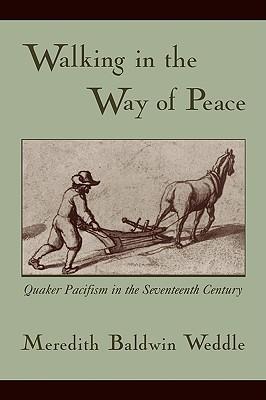Overview
This book investigates the historical context, meaning, and expression of early Quaker pacifism in England and its colonies. Weddle focuses primarily on one historical moment--King Philip's War, which broke out in 1675 between English settlers and Indians in New England. Among the settlers were Quakers, adherents of the movement that had gathered by 1652 out of the religious and social turmoil of the English Civil War. King Philip's War confronted the New England Quakers with the practical need to define the parameters of their peace testimony --to test their principles and to choose how they would respond to violence. The Quaker governors of Rhode Island, for example, had to reconcile their beliefs with the need to provide for the common defense. Others had to reconcile their peace principles with such concerns as seeking refuge in garrisons, collecting taxes for war, carrying guns for self-defense as they worked in the fields, and serving in the militia. Indeed, Weddle has uncovered records of many Quakers engaged in or abetting acts of violence, thus debunking the traditional historiography of Quakers as saintly pacifists. Weddle shows that Quaker pacifism existed as a doctrinal position before the 1660 crackdown on religious sectarians, but that it was a radical theological position rather than a pragmatic strategy. She thus convincingly refutes the Marxist argument that Quakers acted from economic and political, and not religious motives. She examines in detail how the Quakers' theology worked--how, for example, their interpretation of certain biblical passages affected their politics--and traces the evolution of the concept of pacifism from a doctrine that was essentially about protecting the state of one's own soul to one concerned with the consequences of violence to other human beings.
Full Product Details
Author: Meredith Baldwin Weddle (, Yale, State University of New York and Ahmadu Bello University in Nigeria)
Publisher: Oxford University Press Inc
Imprint: Oxford University Press Inc
Dimensions:
Width: 22.90cm
, Height: 2.10cm
, Length: 15.20cm
Weight: 0.540kg
ISBN: 9780195383638
ISBN 10: 019538363
Pages: 368
Publication Date: 01 January 2009
Audience:
General/trade
,
General
Format: Paperback
Publisher's Status: Active
Availability: To order

Stock availability from the supplier is unknown. We will order it for you and ship this item to you once it is received by us.
Reviews
This is not simply another book on Quaker pacifism. Meredith Baldwin Weddle makes a persuasive case for revisiting the birth of the Quaker peace testimony and offers clues to explain the unstable nature of the Quaker witness to nonviolence in the last two centuries.... Her work is more than an addendum to correct an imbalance in the work of earlier historians. It is a more faithful account of the origin of Quaker pacifism itself. --The Historian<br> [A] substantial, valuable addition to Quaker studies. Albion<br> A significant contribution to understanding the complexity of early Quaker theology, especially in a trans-Atlantic context. --The Journal of Religion<br>
<br> This is not simply another book on Quaker pacifism. Meredith Baldwin Weddle makes a persuasive case for revisiting the birth of the Quaker peace testimony and offers clues to explain the unstable nature of the Quaker witness to nonviolence in the last two centuries.... Her work is more than an addendum to correct an imbalance in the work of earlier historians. It is a more faithful account of the origin of Quaker pacifism itself. --The Historian<br> [A] substantial, valuable addition to Quaker studies. Albion<br> A significant contribution to understanding the complexity of early Quaker theology, especially in a trans-Atlantic context. --The Journal of Religion<br>
"""This is not simply another book on Quaker pacifism. Meredith Baldwin Weddle makes a persuasive case for revisiting the birth of the Quaker peace testimony and offers clues to explain the unstable nature of the Quaker witness to nonviolence in the last two centuries.... Her work is more than an addendum to correct an imbalance in the work of earlier historians. It is a more faithful account of the origin of Quaker pacifism itself.""--The Historian ""[A] substantial, valuable addition to Quaker studies.""Albion ""A significant contribution to understanding the complexity of early Quaker theology, especially in a trans-Atlantic context.""--The Journal of Religion"
By focusing on the ambiguity of the peace testimony, Weddle has called into question many other traditional ideas about Quakerism as it developed simultaneously in England and across the Atlantic. The Journal of Religion Weddle persuasively concludes that the peace testimony developed as a variety of beliefs and experiences of individual Quakers. The Journal of Religion
This is not simply another book on Quaker pacifism. Meredith Baldwin Weddle makes a persuasive case for revisiting the birth of the Quaker peace testimony and offers clues to explain the unstable nature of the Quaker witness to nonviolence in the last two centuries.... Her work is more than an addendum to correct an imbalance in the work of earlier historians. It is a more faithful account of the origin of Quaker pacifism itself. --The Historian [A] substantial, valuable addition to Quaker studies. Albion A significant contribution to understanding the complexity of early Quaker theology, especially in a trans-Atlantic context. --The Journal of Religion
Author Information
Meredith Baldwin Weddle is an independent scholar who has taught at Yale, the State University of New York at Purchase, and Ahmadu Bello University in Nigeria.




